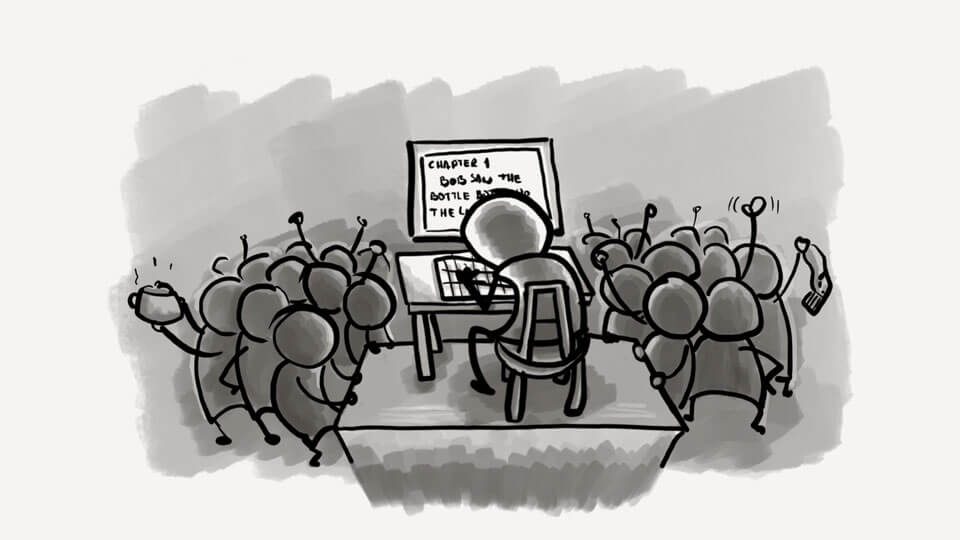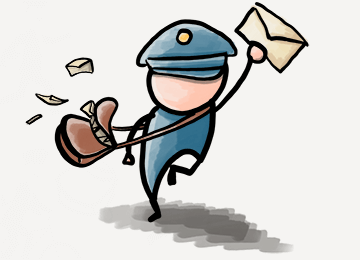Life always gets in the way.
You’re overdue an assignment, your kids are having problems at school, then there’s that big project at work you promised to finish but had no time to look at… and to make it worse, your family just called. They’re coming for the weekend.
“No, please! Not the weekend you heartless bastards,” you want to scream because on the weekend you were hoping to finish that chapter you started more than a month ago. And the worst thing, the absolutely worst thing about this whole mess, is that when you finally get some unexpected free time, you’re too distracted to turn to the one thing you should be doing, which is writing.
That’s life. You’re not alone. We all muddle through the best we can.
Anyone telling you they found some productivity hacks that can solve all of your problems is a fraud. There are no magic pill solutions to being human. However, tweaks exist that could make your life easier.
At least the writing part. No one has the power to make their in-laws go away.
Distractions, distractions
Now, I know you’re pretty serious about your writing, or you wouldn’t be reading this post. And so am I, or I wouldn’t be writing it. But we both struggle.
My personal struggles have reached a peak in 2018 when my wife was going through chemo. Tough times for anyone involved.
I needed a distraction.
Writing didn’t help, but videogames did a fantastic job of keeping my brain occupied through this difficult period. As time went by, everything began working out fine, except for one thing.
I found myself being pulled into gaming more and more. The temporary distraction turned permanent. I needed to get rid of it somehow.
I stumbled across the solution by accident, while reading a book on habits.
How we become our environments
Environments shape our behaviors more than we imagine. The way they do it is not so obvious.
Say you’re trying to cut down on unhealthy snacks. You’ve always kept a plate of cookies for the guests in your living room. Now, with a strong new year’s resolution in mind, you ignore the plate and make an effort not to eat any cookies.
But even a new year’s resolution, that strongest of all short-lived resolutions, will decay and eventually break. And once it does, you fail because you had your immediate surrounding for an enemy.
The plate of cookies kept serving you cues that lead to a bad habit. Each time you saw the plate, you had to spend thought and energy on not doing anything.
Tweaking our environments
Imagine replacing the plate of cookies with a bowl of apples. What do you think will happen? Will you stop eating cookies? Absolutely not.
You will, however, eat them less frequently.
Eating an apple two out of ten times you would’ve normally eaten a cookie, counts as a victory.
And there lies a subtle but really important takeaway.
If eating fewer cookies counts as a win… Then so does writing more words, or having extra time for editing, or brainstorming a couple more ideas than usual. Accumulate enough of these small wins throughout the year, and all of a sudden you managed to write a novel.
Here’s how.
Step One – Remove the distractors
Before you pull out your military-grade vacuum cleaner to purge your surrounding of anything that doesn’t have to do with writing, take a moment to think. You’ll get better results if you can take this slowly rather than all at once. My wife still hasn’t forgiven me for losing that hamster.
Since everyone has their own favorite distractions, I won’t try to guess what yours are, but rather tell you how I got rid of my gaming habit:
- I removed all the desktop icons and anything gaming related from the start menu on my PC,
- I deleted all the gaming bookmarks in my browser,
- I left the gaming console plugged to the home cinema for when friends come over, but I placed it on a higher shelf where I can’t see it,
- I hid all the gamepads in drawers along with all the game boxes,
Nothing too drastic. I made sure gaming disappeared from my visual space. And as it faded from sight, so it faded from my mind. Not all at once, but gradually. I haven’t sat down to play anything ever since I launched this blog.
Identify your favorite distractor, then make it invisible.
Step Two – Exhibit your Writing Cues
Let me ask you this: What makes you want to drop everything and just write?
Visiting big busy bookshops always does it for me. I can hear how the books whisper to anyone passing by, and the slow shifting of sands that make up the human culture. I want to be a part of that.
On a more down to earth note, I have objects that remind me of writing: my laptop, the blank sheet of paper I use for thinking and drawing, my fountain pen, and Brewer’s Dictionary of Phrase and Fable, my longtime creative companion. Oh, and all my writing books. I moved them to eye level to see them first whenever I enter our living room.
What are your writing cues? Identify them, and then spread them all over your environment. Physical as well as digital. You’re much more likely to write if you open your laptop to find the cursor blinking at the last page of your story, rather than a browser with thirty tabs open.
The Long Run
Remember to take it easy. Clear your surroundings of distractions, pepper it with things that bring your attention to writing, and you’ve just given yourself the best chance you have.
Let your environment do some of the work for you.
One very useful read
The book that helped me solve most of my habit problems is The Atomic Habits by James Clear. It goes into fantastic detail about how people form their habits. Best of all, it provides readers with clear actionable advice. No self-help bullshit, only pure usefulness.

